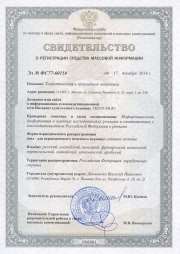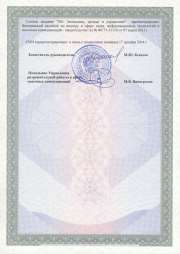MAIN PAGE
> Journal "Theoretical and Applied Economics"
> Contents of Issue № 02/2020
Contents of Issue № 02/2020
|
Gudov M.M., Ermakova E.R. - Structural transformations of Russian economy in the conditions of accelerated digitalization of industrial relations
|
|
pp. 1-8
|
DOI: 10.25136/2409-8647.2020.2.32625
Abstract: The goal of this research is to determine the consequences of accelerated digitalization of industrial relations in the context of structural transformation of Russian economy, as well as substantiate the need and the possibility for structural changes namely in the current period of time. The object of this research is the current and exhausted raw mineral export model of the Russian economy, which requires immediate modification. The subject of this research consists in the study of the impact of current external shocks (abrupt drop in the price of energy resources) upon the changes in the structure of Russian economy (in the sectoral and component views). The structural reform of the Russian economy, which started back in the Soviet period, could not be fully implemented via evolutionary path. Same as all world’s economies, the Russian economy is currently functioning in a state of uncertainty and under influence of external shocks. In the authors’ opinion, these external shocks presently force the accelerated digitalization of industrial relations, which can produce powerful structural transformations of economy, it the government will provide support for corresponding projects.

|
Economic theory and history of economic thought |
|
Mironov D.S. - Industrial parks as a result of evolution of the forms of industrial organization
|
|
pp. 9-27
|
DOI: 10.25136/2409-8647.2020.2.32718
Abstract: This article explores the bases for existence of not only the industrial-technological complex, encompassing workforce with means of production, but also various forms of industrial organization, evolution and peculiarities of which are defined by specialization, cooperation, concentration, combination, as well as development of integration, clusterization, externalization, and diversification of production – means that allow in a new way exchange resources within an industrial system. One of such forms is the industrial parks, which are the object of this research. The article tackles a scientific task that consists in formation of theoretical positions that in a new way reveal the essence of the industrial park as a form of industrial organization, as well as substantiation of the place and role of industrial parks in evolution of the forms of industrial organization. The author formulates number of positions that can serve as the base for structuring and developing a system of knowledge on economic essence of the industrial parks. The original interpretation of the term “industrial park” is proposed, which underlines the key peculiarities of this form of industrial organization.

|
Napolskikh D.L. - Spatial aspect of development of the economic clustering model of Volga Region
|
|
pp. 28-37
|
DOI: 10.25136/2409-8647.2020.2.32676
Abstract: The subject of this research is the internal and external boundaries of Volga Region as a macroregion applicable to the task of development economic clustering model of its regions. The object of this research is the correlation between administrative-territorial boundaries of Volga Region and its economic zoning. The author examines the historical and other prerequisites for emergence of the set of contradictions between economic zoning, defined by the economic-geographical factors, and administrative-territorial division. Special attention is paid to the theoretical concepts and practice of economic zoning in the territory of Volga Region, presenting the results of clarification of the categorical apparatus applicable to the topic of research. The main conclusions of the conducted study consists in presence of the basis for formation of economic space of the Volga Region, as well as Volga – Pre-Urals vector of economic integration. The article also determines the instability of spatial boundaries of Volga Region as a macroregion during the XX – XXI centuries and highlights the key contradictions. The author’s contribution into research of this topic consists in determining two main approaches towards spatial selection of interregional clusters of economic integration within Volga Region.

|
Economic theory and history of economic thought |
|
Tsurikov V.I., Skarzhinskaya E.M. - To the theory of collective actions. Part I. Articulation of the problem
|
|
pp. 38-49
|
DOI: 10.25136/2409-8647.2020.2.29850
Abstract: The subject of this research is the barriers that must be overcome by a collective of individual for the effective use of their self-governance and self-organization resources. Until the moment when Elinor Ostrom was awarded with the Nobel Prize, the majority of economists and politicians were assured that a collective is incapable of managing the common resource effectively. Most popular opinion was reflected in a metaphor: the tragedy of communities. This opinion was traced by an entire number of theoretical models and concepts. Due to high incidence of pessimistic view, the corresponding issues were considered resolved, and thus, were displaced to the periphery of economic science. The falseness of such views was established in the course of field and experimental research of E. Ostrom. This article analyzes the factors that served as the foundation for formation of pessimistic views upon ability of the collective to efficient management of common resource. On the reasons consists in inappropriate identification of the regime of open accesses with communal property. Another one – in the axiom on the inability of a collective, which members pursue egoistic intentions, to efficient usage of common resource in the regime of self-governance and self-organization. These prerequisites led to a conclusion on the need for privatization or nationalization of such resource. The goal of this work consists in theoretical analysis of such opportunities that allow a collective to successfully resolve the faced social dilemmas, when each of them tries to achieve a maximal individual profit.

|
Tsurikov V.I., Skarzhinskaya E.M. - To the theory of collective actions. Part 2. Mathematical model
|
|
pp. 50-60
|
DOI: 10.25136/2409-8647.2020.2.29852
Abstract: The subject of this research is the barriers that must be overcome by a collective of individual for the effective use of their self-governance and self-organization resources. It is assumed that members of the collective are capable to jointly create an additional cost by making individual efforts. Value of the expected gross income increases with the efforts put by each agent, and subordinated to the law of diminishing returns. The goal of each member of the collective consists in maximization of the own individual profit. Within the framework of mathematical modeling, it is demonstrated that in the regime of independent choice of the volume of applied effort, the agents achieve outcome that is the equilibrium by Nash, but inefficient by Pareto. Each member of the collective due to their egoistic intentions is interested in applying the limited amount of efforts that meet the maximum of his individual profit, but all his partners should apply as much efforts as possible. Overcoming of ineffective equilibrium requires coordination of efforts invested by all members of the collective. As follows from the model, the main obstacles on the way to effective usage of human resources by a collective in the regime of self-organization and self-governance is a post-contractual opportunism in form of shirking. The free-rider problem and motivation to opportunistic behavior are generated by the desire of each member of the collective to maximization of their own individual profit in the conditions of force of the law of diminishing returns.

|
Kovalev A.A. - International economic security in the modern era of the clash of civilizations: problem of conceptualization
|
|
pp. 61-74
|
DOI: 10.25136/2409-8647.2020.2.29842
Abstract: This article examines the fundamental approaches towards the problem of international economic security in the developed and developing countries. In each group of the countries prevail the own methodological approaches that depend on civilizational peculiarities and historical experience of a certain country. The goal consists in examination of the key aspect of the problem of conceptualization of international economic security in terms of the clash of civilizations. The author explores various theoretical approaches towards understanding of international economic security; determines the elements of international economic security; indicates the ways for retention and strengthening of international economic security. The article describes the paramount elements of international economic security: need for ensuring sovereignty of the countries; strive towards the absence of exclusive priority in economic development of separate countries or civilizational unions; responsibility of the economically developed countries to the global community for the consequences of implemented by them economic policy; realization of mutually beneficial cooperation of all countries of the global community and peaceful regulation of economic issues; consideration of global problems of the humanity in carrying out the economic security policy; orientation towards free choice of economic paradigm and implementation of own strategy of the political and socioeconomic development by each country.

|
Tsurikov V.I., Skarzhinskaya E.M. - To the theory of collective actions. Part 3. Conditions for achieving an optimum
|
|
pp. 75-85
|
DOI: 10.25136/2409-8647.2020.2.29856
Abstract: The subject of this research is opportunities for effective use of human capital members of the collective in the conditions of self-governance and self-organization resources. It is assumed that members of the collective are capable to jointly create an additional cost by making individual efforts. Value of the expected gross income increases with the efforts put by each agent, and subordinated to the law of diminishing returns. The goal of each member of the collective consists in maximization of the own individual profit. Overcoming ineffective equilibrium faced by the collective as a result of independent choice of amount of effort applied by the members, and achievement of Pareto-preferred outcome requires corresponding coordination of collective actions. The key goal of coordination consists in overcoming opportunistic behaviors in form of shirking and such setting of incentive system that would results in application of optimal efforts by all members of the collective. Within the framework of mathematical model structured on the general principles, the author determines the essential conditions for achieving this goal. One of them dictates a corresponding strategy, another one – formulates the ex post rule of distribution of value of the expected gross income, perceived by all members of the collective as ex ante. According to this rule, the portion of each member of the collective in gross income must be equal his portion of efforts. Acceptance of this rule allows implementing a strategy, which motivates each member of the collective to apply efforts that would meet the maximal combined profit.

|
Tsurikov V.I., Skarzhinskaya E.M. - To the theory of collective actions. Part 4. Use of violence potential
|
|
pp. 86-95
|
DOI: 10.25136/2409-8647.2020.2.30246
Abstract: The subject of this research is opportunities for effective use of human capital members of the collective in the conditions of self-governance and self-organization resources. It is assumed that members of the collective are capable to jointly create an additional cost by making individual efforts. Value of the expected gross income increases with the efforts put by each agent, and subordinated to the law of diminishing returns. The goal of each member of the collective consists in maximization of the own individual profit. Achievement of the socially optimal level of applied efforts requires coordination of actions based on the high level of trust between all members of the collective. Within the framework of mathematical model, it is demonstrated that the lack of trust to some extent can be compensated by the incentives based on the use of violence potential. Most successful implementation of such type of incentives is possible only in the relatively small collectives in the conditions of inevitability of punishment for violation, and cautions use of force. In large collectives, a low probability of punishment for violence turns out either in low significance of the expected punishment, or extremely high meaning of nominal punishment. In first instance, a threat of punishment can play a role of a constraining factor; while on the other instances – lead to a stiff punishment that may reduce the usefulness of a violator to an extremely low level. Therefore, the achieved by the collective result can be incomparable by Pareto even with Nash equilibrium.

|
Safiullin M.R., Savelichev M.V., El'shin L.A., Moiseev V.O. - Internalization of externalities on the basis of blockchain
|
|
pp. 96-104
|
DOI: 10.25136/2409-8647.2020.2.33010
Abstract: The subject of this research is the generated by economic system positive and negative externalities and possibility of their account on the basis of innovative technologies. Currently, we can observe escalation of problems associated with the need for minimization of negative externalities, which create global risks for the world economic system. Most severe risks relate to ensuring sustainability of financial system, environmental pollution, climatic changes, and outbreak of new deadly diseases. Therefore, there is a need for implementation of the element of circular economy based on non-waste technologies that allow minimizing the negative externalities. The novelty of this study consists in demonstration of the possibility of using blockchain technologies for building a system of accounting positive and negative externalities generated within the economic system. Tokenization on the blockchain platform creates a possibility for formation of the indicated mechanism. The system of tokenization of externalities includes: a) formulation of target behavior of economic agents; b) creation of blockchain platform ensuring emission of tokens; c) determination of the exchange rate of tokens by economic agents for economic incentives; d) performance assessment of economic agents of reduction of negative externalities and increase of positive externalities. The emitted within the framework of blockchain platform of national project tokens would be distributed among the participants of national project, including enterprises, regional and local authorities, activists among the population, initiative groups, thus forming a flexible system of reinforcement of actors. Use of the described model of tokenization of externalities turns these projects transparent for the population and makes them the full-fledged members of an expert community that assesses the level of externalities and their minimization on the basis of tokens economy.

|
Kopyrin A.S. - Modeling and forecasting of the dynamics of “quality of life” of the population of Krasnodar Krai
|
|
pp. 105-116
|
DOI: 10.25136/2409-8647.2020.2.32192
Abstract: The goal of this research consists in the analysis of trends in a compositely structured index of the “quality of life”, and analysis of sensitivity of a complex indicator by separate factors and cross-section of population of Krasnodar Krai. Based on the acquired results, the author builds a mathematical economic model for the analysis and forecasting of changes in the quality of life of the population of Krasnodar Krai in the context of diverse clusters of municipal formations, as well as compares different functions of approximation. The subject of this research is the socioeconomic interaction within the regional system of Krasnodar Krai. The article carries out a retrospective analysis is conducted on the most important indexes characterizing the subject field, correlation-regression analysis of variables, and sensitivity analysis based on the coefficients of elasticity of private factors. The author’s main contribution into the research of this topic lies in building the regression models of the quality of life index of the population of Krasnodar Krai in the context of diverse social clusters, as wll as in determination of the degree of impact of separate social, demographic or economic factors upon complex indicator. Such models allow forecasting and carrying out experimental modeling in this area.

|
Mathematical modeling and instrumental methods in economics |
|
Shakra M., Shmidt Y.D. - Assessment of the impact of factors upon tourism revenue in Jordan
|
|
pp. 117-128
|
DOI: 10.25136/2409-8647.2020.2.30039
Abstract: This article examines Jordan’s tourism revenue over the recent years. Tourism is a substantial source of national revenue and significantly contributes to the flow of foreign currency for the development of national economy. The economic theory claims that tourism revenue is affected by a wide range of factors. The article explores the impact of consumer price index and number of tourists upon Jordan’s tourism revenue. In the course of this study, the author used the statistical data of the World Bank and International Monetary Fund; applied Autoregressive Distributed Lag model (ARDL); and conducted necessary diagnostic tests in Eviews 9 software. The research demonstrated that high internal inflation ratios reduce the external demand for tourism services in Jordan, and thus significantly decrease the tourism revenue. Over a long-term, the author determines a negative influence of consumer price index upon tourism revenue in Jordan and the expected positive influence of the number of tourists thereof.

|
World economy and international economic relations |
|
Ledeneva M.V., Plaksunova T.A. - Economic growth and prospects for economic development of African countries southward Sahara
|
|
pp. 129-139
|
DOI: 10.25136/2409-8647.2020.2.32732
Abstract: This article is dedicated to analysis of the process of economic growth and development in African countries southward Sahara – the least industrializes region of the world. The main prerequisites for industrialization and economic growth in of African countries southward Sahara are the high urbanization ratios: the growing number of workforce, their qualification level, high portion of youth within the population structure, expanding domestic market, growing middle class, de-escalation of internal political confrontations and attenuation of cross-country armed conflicts, advancement of digital technologies. The information and empirical basis is comprised of the data of the United Nations Industrial Development Organization and the World Bank. The scientific novelty consists in determination of the points of growth in Africa southwards Sahara by means of application of the methods of statistical data analysis. The authors analyze the indicators of economic growth and industrialization of African countries southward Sahara, substantiate the increasing role of this region for the global economy. The article reveals spatial aspects of industrialization of African countries and allocation of the industrial production. The authorities of African countries must manage the industrialization processes, namely focus on the development of infrastructure, improvement of investment climate, transparency of legislation, reduction of administrative expenses for businesses, reduction of corruption, and prevention of armed conflicts. The regional integration would contribute to solution of the aforementioned issues. The key vectors in cooperation of African countries southward Sahara and Russia are the areas of oil extraction, energy sphere, information and communication technologies, and agriculture.

|






